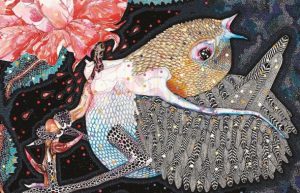Editor’s note: As the content of this story may be triggering to some survivors due to graphic and explicit content, only an excerpt of the story is posted here, without this kind of content. The full version of the story may be read here - please practice self-care if you decide to read it in full.
My initial pursuit of law school, as I’m sure many other would-be lawyers can relate to, was influenced greatly by my childhood introduction to To Kill a Mockingbird. Not only does this work detail one of literature’s controversial rape trials, it also signifies to me about what must be demanded in our society to end rape culture. In this prolific passage, the title’s importance is explained in the form of a lesson on birds:
Atticus said to Jem one day, “I’d rather you shot at tin cans in the back yard, but I know you’ll go after birds. Shoot all the bluejays you want, if you can hit ’em, but remember it’s a sin to kill a mockingbird.” That was the only time I ever heard Atticus say it was a sin to do something, and I asked Miss Maudie about it.
“Your father’s right,” she said. “Mockingbirds don’t do one thing but make music for us to enjoy. They don’t eat up people’s gardens, don’t nest in corncribs, they don’t do one thing but sing their hearts out for us. That’s why it’s a sin to kill a mockingbird.”
An avid recreational bird watcher, I spend a great deal of time in the company of mockingbirds. They will sing all day if unbothered by other business. But they do not sing songs of their own. Instead, they repeat a phrase of another bird’s call in a pattern, usually three times. Fierce nest guardians, they only reveal a cry of their own when asserting their dominance over their territory. It is a shrill and broken buzz. But the nightingale, though small in stature, is renowned for its powerful and beautiful song, a song of its very own. A song heralded as the most beautiful birdsong in the word. I posit then, that to silence a nightingale is just as great a sin as killing a mockingbird.
Sexual violence is not about sex, it is about power. The power is stolen from the victim, ripped out of the victim’s body. It may take years to find that power again. It may never return. When someone’s power is taken, without consent, something happens to the voice as well. The vocal chords shrivel in fear, their screams denied. Without a sense of personal power and autonomy, the voice seems useless, as useless as a bruised eye or broken pelvis. Unless that voice is nurtured and soothed, it cannot share, it cannot sing. And then silence falls.
Rape culture systematically silences its victims. It silences them through victim blaming, through slut shaming, through denying fair and thorough investigations, through failing to prosecute rapists. When a nation silences one in three of its women or one in six of its men, it tells them that their voices do not matter, their stories do not matter, their lives do not matter. By standing idly by, we are creating a new class of people that believe they cannot make a difference. This cycle survived for far too long. Too many voices have been silenced. I finally decided mine would never be hushed again.
>>>>>>>>>>>>>>>>>>>>>>>>>>>>>>>>>>>>>>>>>>>>>>>>>>>>>>>>>>>>>>>>>>>>>>>>>>>>>
Sexual repression is a disease, and rape culture is one symptom. Likewise, sexual violence is both the transportation of sexual repression across time and a manifestation of the repression itself. My research, now immortalized in text, is my attempt at a cure. By positively altering the perception of sex held by a sexually repressed citizenry, the cycle can not only be broken, but also eliminated through a direct attack on the underlying malady. Nothing offered me greater comfort than finally acknowledging that my rape was not a personal attack; I was a passive cog, one in three, entangled by an evil, cyclical machine. Now, I will be silenced no more, and I will continue to shout until the message is received.
Kara Large earned her law degree in May 2015 after finishing a thesis on the sexual violence epidemic in America. Her work is now available as a free resource for all at www.tosilence.com.

The Nightingale and the Rose by Del Kathryn Barton